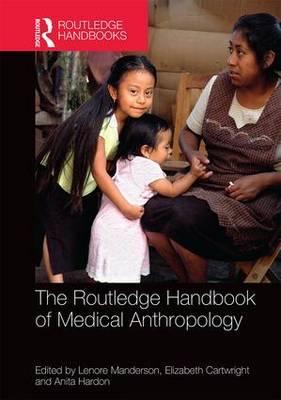Routledge
Handbook
of
Medical
Anthropology
Edited by
Lenore Manderson,
Elizabeth Cartwright, & Anita Hardon
“The international scope of its authorship, both of editors and contributors, is something else that sets this book apart from others. It represents intellectual institutional homes in Western Europe, Australia, North America, and Southern Africa. Theories emanating from the University of Amsterdam and other Western European schools are well represented throughout, like Annemarie Mol’s writings on ontology and technology. Manderson’s vast professional archive on gender, health and the environment supports the volume as a whole, as does Hardon’s work on pharmaceuticals and HIV/AIDS and Cartwright’s on structural vulnerabilities, indigeneity, and immigration.” – Casey Golomski, Somatosphere
The
Book
The Routledge Handbook of Medical Anthropology provides a contemporary overview of the key themes in medical anthropology. In this exciting departure from conventional handbooks, compendia and encyclopedias, the three editors have written the core chapters of the volume, and in so doing, invite the reader to reflect on the ethnographic richness and theoretical contributions of research on the clinic and the field, bioscience and medical research, infectious and non-communicable diseases, biomedicine, complementary and alternative modalities, structural violence and vulnerability, gender and ageing, reproduction and sexuality. As a way of illustrating the themes, a rich variety of case studies are included, presented by over 60 authors from around the world, reflecting the diverse cultural contexts in which people experience health, illness, and healing. Each chapter and its case studies are introduced by a photograph, reflecting medical and visual anthropological responses to inequality and vulnerability. An indispensible reference in this fastest growing area of anthropological study, The Routledge Handbook of Medical Anthropology is a unique and innovative contribution to the field.
Format Electronic book text | 394 pages
Publisher Taylor & Francis Ltd
Imprint ROUTLEDGE
Publication City/Country United Kingdom
The
Editors
LENORE MANDERSON is Professor of Public Health and Medical Anthropology at the School of Public Health, University of the Witwatersrand, South Africa, and Professor of Anthropology at the Institute at Brown for Environment and Society, Brown University, USA.
ELIZABETH CARTWRIGHT is Professor of Anthropology and Director of the Hispanic Health Projects and the Latino Studies Program at Idaho State University, USA.
ANITA HARDON is Professor of Health and Social Care at the Faculty of Social and Behavioural Sciences and Dean of the Amsterdam Institute for Social Science Research, at the University of Amsterdam, the Netherlands.
a table of
Contents
& Authors
INTRODUCTION: SIGN POSTS
Lenore Manderson, Elizabeth Cartwright and Anita Hardon
1. CHANGING CHILDHOODS
Lenore Manderson, Elizabeth Cartwright and Anita Hardon
1.1 Children with diabetes (Christine Dedding)
1.2 Rare diseases in children in Italy (Alice Larotonda)
1.3 Autism spectrum disorder in Vietnam (Vu Song Ha)
1.4 Children’s idioms of distress (Ria Reis)
2. SEXUALITY AND TECHNOLOGY
Anita Hardon, Lenore Manderson and Elizabeth Cartwright
2.1 Feminizing the body (Panoopat Poompruek, Pimpawun Boonmongkon and Thomas E. Guadamuz)
2.2 Body, sex, and diet in Mozambique (Arianna Huhn)
2.3 Empowerment and the use of vaginal microbicides (Robert Pool)
2.4 Donating semen in Denmark (Sebastian Mohr)
3. THE SOCIALITIES OF HIV
Anita Hardon, Lenore Manderson and Elizabeth Cartwright
3.1 Freedom Corner (Emmy Kageha Igonya and Eileen Moyer)
3.2 Chronicle of a Mosotho boy (Ellen Block)
3.3 Coming of age on the streets (Thomas Stodulka)
4. STRESSES IN EVERYDAY LIFE
Anita Hardon, Elizabeth Cartwright and Lenore Manderson
4.1 A cold of the soul (Junko Kitanaka)
4.2 Psychoanalysis in Buenos Aires (P. Sean Brotherton)
4.3 Promoting smoking in Indonesia (Mark Nichter and Mimi Nichter)
5. BODILY RESISTANCES
Elizabeth Cartwright, Anita Hardon, and Lenore Manderson
5.1 Rebellion and co-morbidity (Megan Wainwright)
5.2 Relatedness in anorexia (Megan Warin)
5.3 Governing by complaint (Jessica Mulligan)
6. THE CHRONICITY OF ILLNESS AND DISEASE
Lenore Manderson, Elizabeth Cartwright and Anita Hardon
6.1 Mass drug administration for neglected tropical diseases (Tim Allen and Melissa Parker)
6.2 Diagnosis and the punctuated life-course (Carolyn Smith-Morris)
6.3 Amputated identity (Narelle Warren)
6.4 Facing up to breathlessness (Marjolein Gysels and Irene J. Higginson)
7. WAYS OF CARING
Elizabeth Cartwright, Anita Hardon and Lenore Manderson
7.1 Care, self-management and the webcam (Hilde Thygesen and Jeanette Pols)
7.2 E-care in Kerala (Tanja Ahlin)
7.3 Illnesses without a cause (Gesine Kuspert Hearn)
8. ENDINGS
Lenore Manderson, Elizabeth Cartwright and Anita Hardon
8.1 Becoming old and frail in coastal Tanzania (Piet van Eeuwijk and Brigit Obrist)
8.2 Alzheimer’s disease in urban Brazil (Annette Leibing)
8.3 Caring for corpses in Singapore (Ruth E. Toulson)
9. MARKETING MEDICINE
Anita Hardon, Lenore Manderson and Elizabeth Cartwright
9.1 The compounding pharmacy in Brazil (Emilia Sanabria)
9.2 Policing ‘counterfeit medication’ (Julia Hornberger)
9.3 How a lifestyle product became a pharmaceutical specialty (Laurent Pordié)
9.4 Cosmopolitan phytoremedies in Senegal (Alice Desclaux)
10. THE ANTHROPOCENE
Elizabeth Cartwright, Lenore Manderson and Anita Hardon
10.1 Inuit health in a changing Arctic (Noor Johnson)
10.2 Environmental pollution and allergies (Roberta Raffaetá)
10.3 Reading the environment (Ben McMahan)
10.4 Disastrous recovery (Vincanne Adams)
11. GLOBAL VULNERABILITIES
Elizabeth Cartwright, Lenore Manderson and Anita Hardon
11.1 Medical travel (Andrea Whittaker and Chee Heng Leng)
11.2 Health care along the US/Mexico border (Heide Castañeda)
11.3 “I haven’t paid this karma yet” (Susann Huschke)
12. WAR, VIOLENCE AND SOCIAL RESPONSE
Lenore Manderson, Elizabeth Cartwright and Anita Hardon
12.1 Honduras: Practicing wartime healing (Adrienne Pine)
12.2 Does Sgt Pearson have PTSD? (Alexander Edmonds)
12.3 Life in a state of fear (Meagan Wilson)
12.4 Exhuming the disappeared (Rachel Carmen Ceasar)
13. GENES, KINSHIP AND RISK
Anita Hardon, Lenore Manderson and Elizabeth Cartwright
13.1 Direct-to-consumer genetic testing in China (Suli Sui and Margaret Sleeboom-Faulkner)
13.2 Harvesting umbilical cord blood (Simonetta Cengarle)
13.3 Genetics, childhood development and kinship (Janice McLaughlin)
13.4 Suicide and the epigenetic turn (Stephanie Lloyd)
13.5 Techno-benefits and social risks (Barbara Herr Harthorn)
14. HOW THE LOGICS OF BIOMEDICAL PRACTICE TRAVEL
Elizabeth Cartwright, Anita Hardon and Lenore Manderson
14.1 Humanistic obstetrics in Brazil (Eugenia Georges and Robbie Davis-Floyd)
14.2 Entrepreneuring barren grounds (Trudie Gerrits and Viola Hörbst)
14.3 Surgery and the cultural politics of global health (Adia Benton)
14.4 ‘Safe burials’ and the 2014-2015 Ebola outbreak in Sierra Leone (Raphael Frankfurter)
14.5 Doctors Without Borders and the global emergency (Peter Redfield)
VITAL SIGNS: MEDICAL ANTHROPOLOGY IN THE 21ST CENTURY

